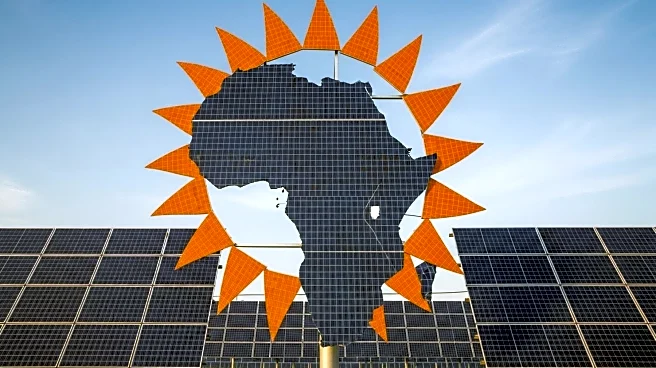What's Happening?
Africa possesses 60% of the world's best solar resources, yet it only received 2% of global clean energy investments in 2024. The continent's deserts and warm climate offer significant potential for solar projects, as demonstrated by the KHI Solar One project in South Africa's Northern Cape province. This solar thermal plant generates 50 megawatts of electricity, enough to power over 40,000 households. Despite this potential, Africa's renewable energy capacity remains underdeveloped compared to more advanced economies. The International Energy Agency reports that about 600 million people in Africa live without electricity, impacting access to education, healthcare, and economic growth. African leaders have committed to increasing renewable energy capacity to 300 gigawatts by 2030, with projections suggesting that 90% of Africa's power could be generated from renewables by 2050.
Why It's Important?
The underinvestment in Africa's solar energy sector represents a missed opportunity for both the continent and global investors. Increasing investment in Africa's solar potential could significantly improve electrification rates, enhance quality of life, and stimulate economic growth. For global investors, Africa offers a largely untapped market with vast resources and growing demand for renewable energy solutions. The continent's shift towards renewable energy could also contribute to global efforts to combat climate change by reducing reliance on fossil fuels. As Africa aims to increase its renewable energy capacity, there is potential for significant economic and environmental benefits, both locally and globally.
What's Next?
African leaders and international stakeholders are expected to continue discussions on increasing renewable energy investments at upcoming climate summits. The focus will likely be on creating favorable investment conditions and partnerships to accelerate the deployment of solar and other renewable energy projects. Additionally, there may be increased efforts to attract private sector investment and leverage international funding mechanisms to support Africa's energy transition. The success of these initiatives will depend on the collaboration between African governments, international organizations, and private investors to address infrastructure and policy challenges.
Beyond the Headlines
The development of Africa's solar energy sector could have broader implications for global energy markets and climate policy. As Africa increases its renewable energy capacity, it could become a key player in the global energy transition, influencing energy prices and supply chains. Furthermore, the continent's experience in scaling up renewable energy could provide valuable lessons for other regions with similar challenges. The ethical dimension of ensuring equitable access to energy resources and addressing energy poverty will also be a critical consideration in Africa's energy strategy.










